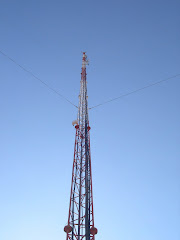But is it a good fight? Ahhh ...
The fight with VHF repeater continues. On April 11, 2018, the RC-210 controller was removed from the repeater (that's why there is no courtesy tone). There are actually two auxiliary receivers connected to that controller and while it was unlikely that this was injecting the interfering signal into the system, it was easy enough to remove it to test. Removing the controller was not expected to magically fix everything, and it didn't, but it did give us some more data - in the interval between a mobile unit unkeying and the repeater's transmitter dropping, the "other" signal was apparent. That's the good news. The bad news is that the signal is probably the repeater's transmitter on 147.0600 MHz.
The duplexer (not diplexer) is the filter that is supposed to keep the repeater's receiver from hearing its own transmitter. This is no small trick given that there is a 25-W signal on 147.0600 MHz and the repeater is trying to listen for signals 600 kHz away (147.6600 MHz) that are in the microvolt range ... at the same time ... on the same feedline and antenna.
Miraculously (or maybe not if you know N5MS), Mike had a duplexer "in stock". The unit was tuned up on "66/06" (that's how hams 40 years ago described a repeater - input/output) and placed in service today by N5HZR and N5UWY. If this "cures" the problem then the next steps are pretty clear. Note that in the repeater rehabilitation work that the Technical Committee has done over the past several years, the duplexer was the only component not replaced.
Unfortunately, in order to install the temporary duplexer, the NORMAN digipeater (on the APRS frequency of 144.3900 MHz) was removed from service. The digipeater shares the VHF repeater's antenna and feedline by use of a multi-coupler (similar to a duplexer - a tight filter that keeps 147.0600 MHz RF away from 144.3900 MHz). This is unfortunate for a couple reasons - 1) APRS users are deprived of a high-site digipeater and 2) it's possible that the digipeater itself was an issue (it's not at all clear that it was).
Time will tell if this is the "cure."
2018-05-03
Subscribe to:
Posts (Atom)
